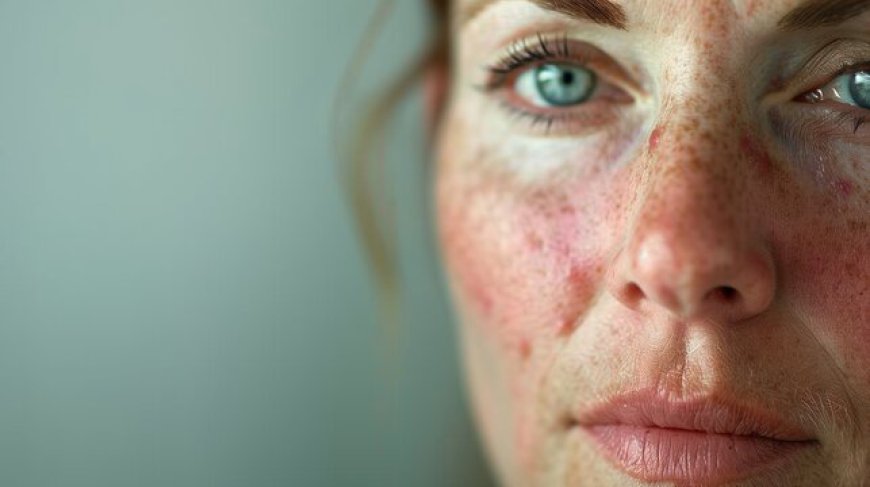Rosacea: Your Guide to a Clearer Complexion - Understand Causes and Cures

Rosacea is a common, chronic skin condition that affects millions of people worldwide, characterized by facial redness, visible blood vessels, and, in some cases, acne-like bumps. While it can be distressing, understanding its causes and exploring effective treatments can lead to clearer skin and improved confidence. This comprehensive guide will help you navigate the complexities of Rosacea Treatment in Dubai, from its triggers to potential cures.
Understanding Rosacea
Rosacea typically manifests as persistent redness in the central part of the face, often mistaken for sunburn or allergic reactions. The condition can progress through several stages, starting with intermittent flushing and advancing to more pronounced symptoms, including:
- Persistent facial redness: A constant flushed appearance, often accompanied by burning or stinging sensations.
- Visible blood vessels: Small, dilated blood vessels may become prominent, particularly on the nose and cheeks.
- Pimples and bumps: These can resemble acne and may be accompanied by swelling and tenderness.
- Thickened skin: In some cases, rosacea can lead to a thickening of the skin, particularly on the nose (a condition known as rhinophyma).
Causes of Rosacea
While the exact cause of rosacea remains unclear, several factors may contribute to its development:
1. Genetics:
Research suggests that genetics play a significant role in rosacea. If you have a family history of the condition, your chances of developing it increase.
2. Immune System Response:
An abnormal immune response may trigger inflammation in the skin, leading to the symptoms associated with rosacea. This heightened sensitivity can result from exposure to certain irritants or environmental factors.
3. Environmental Triggers:
Various environmental factors can exacerbate rosacea symptoms. Common triggers include:
- Sun exposure: Ultraviolet (UV) rays can irritate the skin and worsen rosacea.
- Hot or cold weather: Extreme temperatures can lead to flushing and increased redness.
- Spicy foods and hot beverages: Certain foods and drinks can cause blood vessels to dilate, resulting in flushing.
- Alcohol: Alcohol consumption, particularly red wine, is a known trigger for many individuals.
- Stress: Emotional stress can provoke flare-ups, as it triggers the body’s fight-or-flight response.
4. Demodex Mites:
These microscopic mites, which live on human skin, may play a role in rosacea. Individuals with rosacea tend to have a higher concentration of these mites, leading researchers to explore their potential involvement in the condition.
Diagnosing Rosacea
Diagnosing rosacea typically involves a thorough examination by a dermatologist. There is no specific test for rosacea, so your doctor will assess your symptoms, medical history, and family background. They may also inquire about your triggers and any other skin conditions you may have.
Effective Treatments for Rosacea
While there is no cure for rosacea, several treatments can help manage symptoms and improve the appearance of the skin:
1. Topical Treatments:
Dermatologists often prescribe topical medications to reduce redness and inflammation. Common options include:
- Metronidazole: An antibiotic that helps reduce inflammation and redness.
- Azelaic acid: This treatment has both anti-inflammatory and antibacterial properties, making it effective in treating rosacea.
- Ivermectin: A topical medication that helps reduce the number of Demodex mites on the skin.
2. Oral Medications:
In more severe cases, dermatologists may prescribe oral antibiotics, such as doxycycline or tetracycline, to help control inflammation and reduce pustules.
3. Laser and Light Therapy:
Laser treatments, such as pulsed dye lasers or intense pulsed light (IPL), can effectively reduce visible blood vessels and redness. These procedures work by targeting and collapsing the dilated blood vessels while minimizing damage to surrounding skin.
4. Skincare Routine:
A gentle skincare routine is essential for managing rosacea. Here are some tips:
- Use mild cleansers: Avoid harsh soaps and exfoliants that can irritate the skin. Look for gentle, fragrance-free cleansers.
- Moisturize: Keeping the skin hydrated can help reduce irritation. Choose a non-comedogenic moisturizer that won’t clog pores.
- Sunscreen: Protecting your skin from the sun is crucial. Use a broad-spectrum sunscreen with SPF 30 or higher daily, even on cloudy days.
5. Lifestyle Changes:
Making certain lifestyle adjustments can help minimize flare-ups:
- Identify and avoid triggers: Keep a diary to track your symptoms and identify specific triggers, allowing you to avoid them more effectively.
- Practice stress management: Techniques such as yoga, meditation, or deep breathing exercises can help reduce stress levels and minimize flare-ups.
Conclusion
Rosacea can significantly impact your quality of life, but understanding its causes and exploring available treatments can pave the way for a clearer complexion. If you suspect you have rosacea, consult a dermatologist for an accurate diagnosis and tailored treatment plan. By adopting a proactive approach and making necessary lifestyle changes, you can manage this condition and enjoy healthier, more radiant skin. Remember, while rosacea is a chronic condition, with the right care and management, it is possible to live comfortably and confidently.
